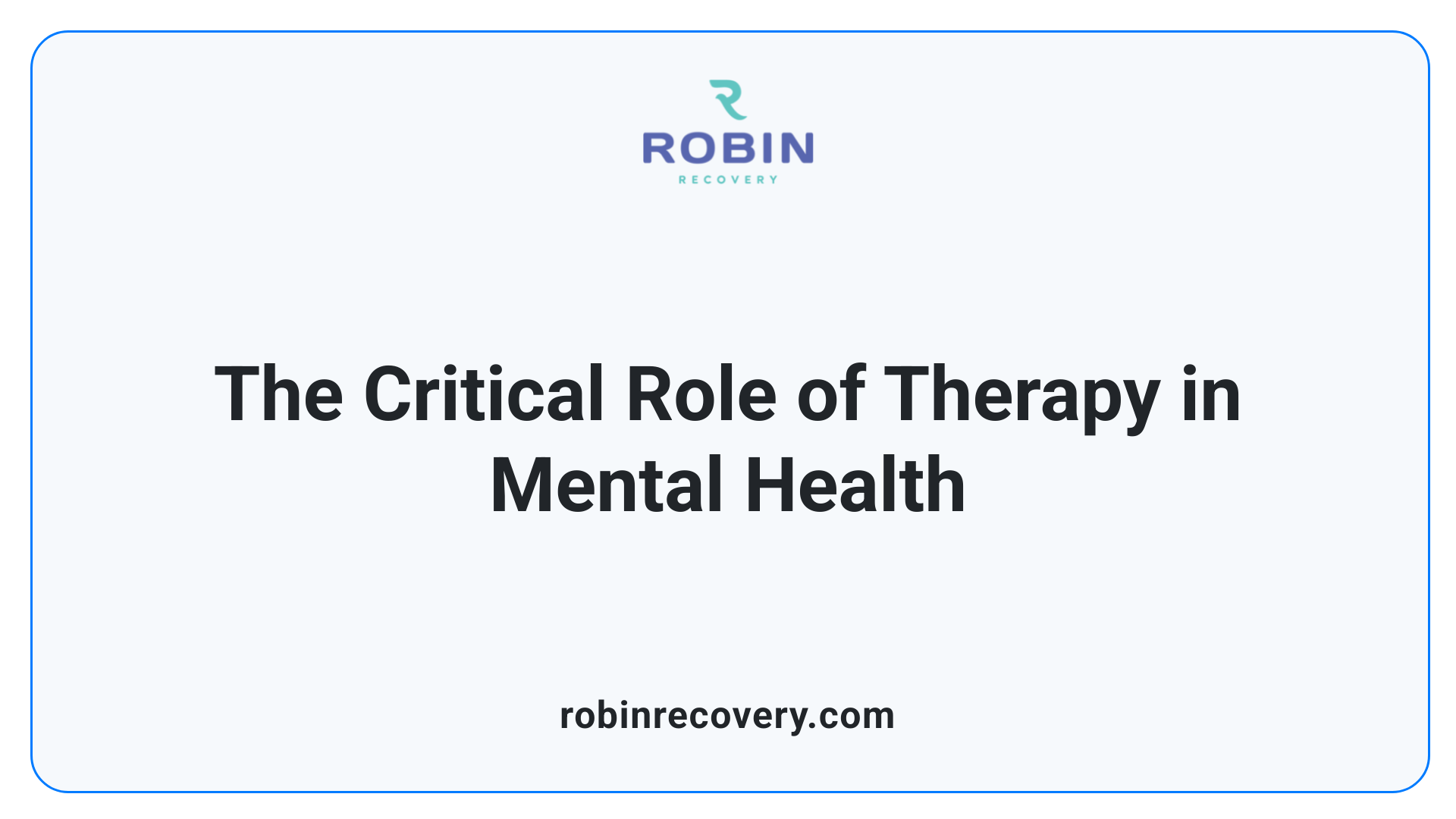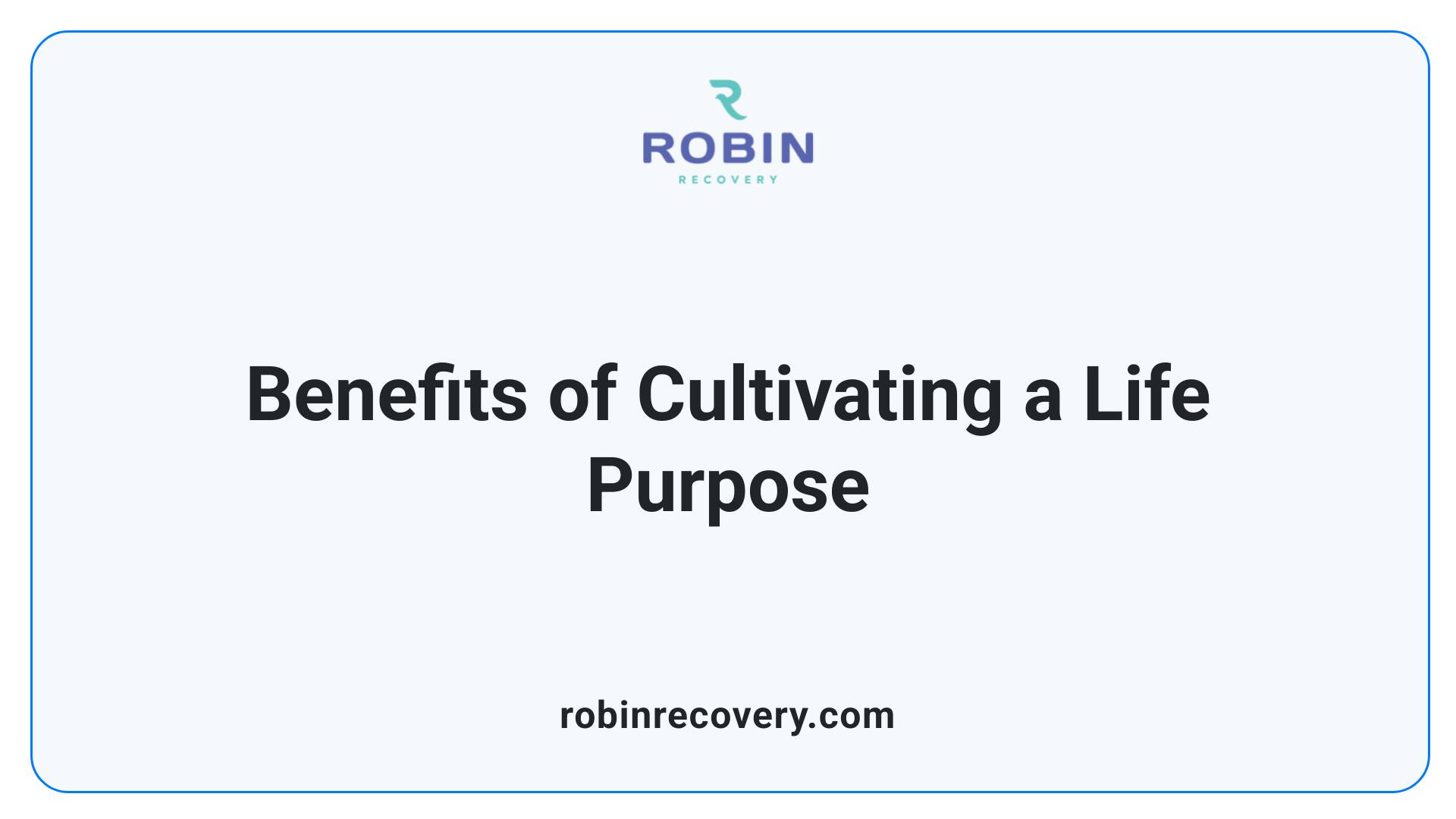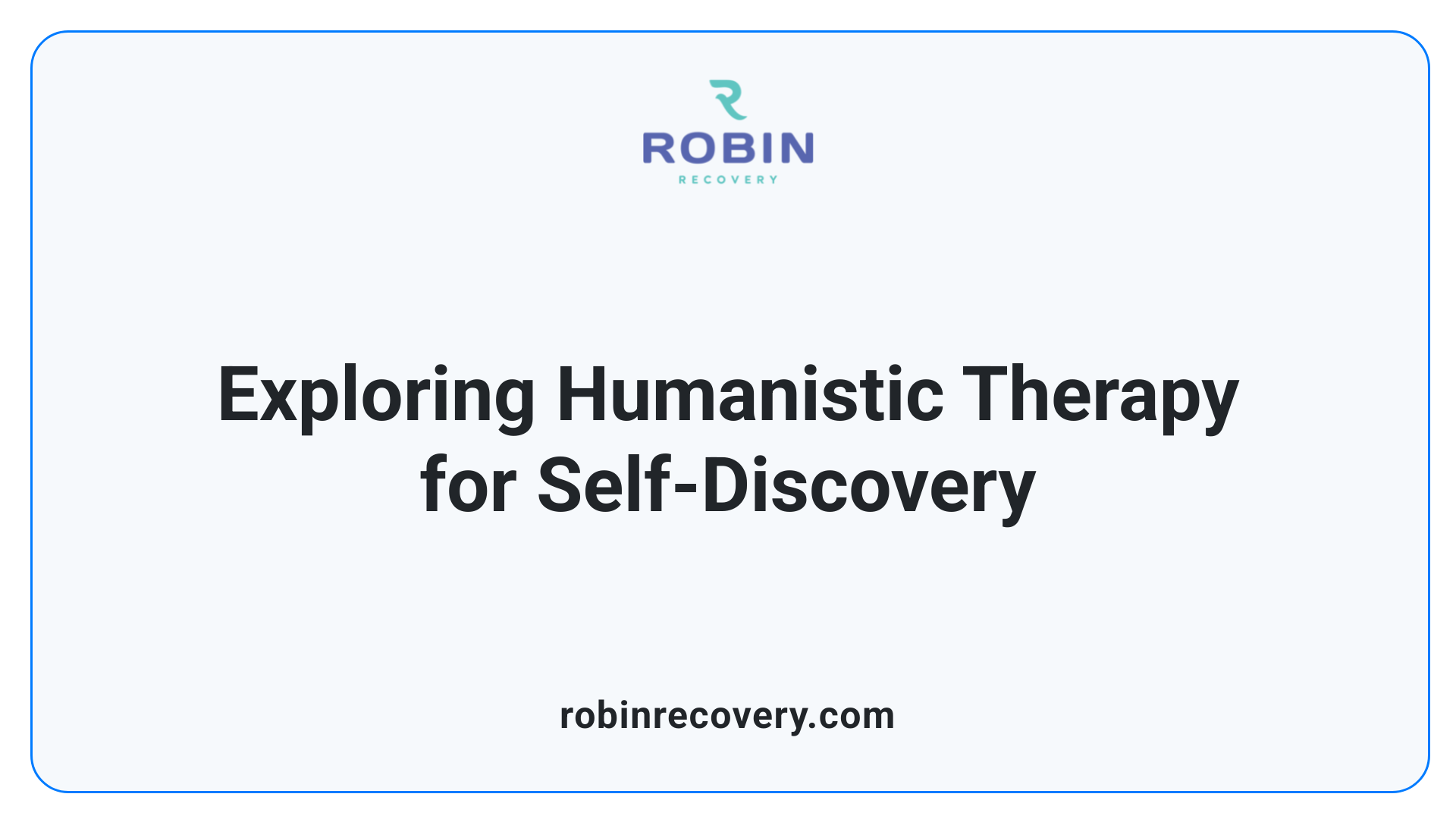How therapy helps individuals rebuild their sense of purpose

Introduction: The Essential Role of Purpose in Mental Well-being
In the journey through life, maintaining a sense of purpose can often be the anchor that keeps individuals grounded amidst the chaos of everyday challenges. When faced with mental health struggles, this sense of purpose may become elusive; however, therapy offers a pathway to reclaiming it. By examining different therapeutic techniques and their benefits, individuals can find a renewed sense of meaning and direction in life.
Understanding the Mechanics of Therapeutic Techniques

What is the true purpose of therapy?
The true purpose of therapy extends beyond simply alleviating symptoms; it is fundamentally about enhancing individuals' understanding of their mental processes and emotions. Therapy fosters healthier habits and mindsets by offering effective interventions that often lead to long-lasting behavioral changes. This is particularly relevant for conditions such as anxiety and depression, where research shows therapy can yield results comparable to medication.
Therapeutic techniques like Cognitive Behavioral Therapy (CBT) and Acceptance and Commitment Therapy (ACT) address both individual triggers and relational dynamics. By utilizing mechanisms such as neuroplasticity, therapy can positively influence brain function, facilitating better emotional regulation. These therapeutic methods teach coping skills and resilience, thereby equipping individuals to handle future challenges effectively.
Moreover, therapy provides a structured environment where individuals can engage deeply with their thoughts and feelings. This exploration is crucial for personal growth and for defining what purpose means to them. The end goal encompasses not just immediate relief but also a pathway for sustainable growth and resilience, allowing clients to rebuild their identities and reconnect with their sense of purpose.
The Vital Importance of Therapy in Mental Health Care

Why is therapy important for mental health?
Therapy is essential for mental health because it creates a structured space for individuals to delve into their emotions, thoughts, and behaviors with the guidance of professionals. Through various evidence-based approaches, including cognitive-behavioral therapy (CBT) and person-centered therapy, individuals learn effective coping strategies to navigate life's complexities.
The therapeutic alliance—the bond between therapist and client—is a critical element. A strong therapeutic relationship fosters trust, encouraging open communication and facilitating deep self-exploration. This connection enhances treatment outcomes, making therapy particularly effective for issues like depression and anxiety.
Research underscores therapy's effectiveness, showing that psychotherapy can be as beneficial, if not more so, than medication alone. Patients often report improved emotional resilience and adaptive skills, promoting long-term mental well-being.
How do therapists and therapeutic alliances contribute to recovery?
Therapists play a pivotal role in fostering recovery by providing a safe, non-judgmental environment where clients can articulate their concerns. Through supportive interactions, therapists help clients explore their core beliefs, aspirations, and barriers to achieving a sense of purpose.
The therapeutic process often involves exploring negative thought patterns and reframing them into more positive narratives, cultivating self-compassion and resilience. By building a strong therapeutic alliance, individuals are more likely to feel validated and empowered, which is integral to rebuilding their sense of identity and purpose.
The Cognitive and Emotional Benefits of a Life Purpose

Impact of Purpose on Mental Health
A strong sense of purpose is a powerful motivator that aids in mental health recovery. Those who cultivate a clear purpose experience reduced symptoms of depression and anxiety. This motivational anchor helps individuals engage in activities that enhance well-being, thus improving cognitive function and emotional resilience.
Mindfulness, goal-setting, and community engagement are vital strategies for building this sense of purpose. Support from loved ones can also facilitate personal growth by helping individuals articulate their goals, affirm their strengths, and maintain accountability. This collaborative effort is crucial in navigating life changes and reinforces the idea that recovery is both a journey and a shared experience.
Improvement in Cognition with a Sense of Purpose
Having a purpose in life enhances cognition by fostering healthy behaviors and reducing overall stress. Individuals driven by purpose are often more inclined to engage in regular exercise, maintain a balanced diet, and seek meaningful activities, which collectively improve physical and mental well-being. Furthermore, lower stress levels linked to a purposeful life contribute to reduced anxiety and better emotional regulation.
Engaging in community service or volunteering reinforces social connections, creating a sense of belonging and fulfillment. Activities that promote mental engagement, such as participating in discussion groups or workshops, can bolster cognitive skills and encourage lifelong learning. Overall, cultivating a sense of purpose provides numerous benefits, contributing significantly to mental health and cognitive function.
Therapies Guiding Individuals Toward Personal Meaning

Which therapy helps individuals understand their feelings and gain a sense of meaning in life?
Humanistic therapy aids individuals in understanding their feelings and finding meaning in life. This approach prioritizes personal growth and self-actualization, characterized by principles such as empathy, unconditional positive regard, and a client-centered focus.
Pioneered by figures like Carl Rogers and Abraham Maslow, humanistic therapy encourages self-exploration, allowing for a deeper comprehension of personal experiences.
Key forms of humanistic therapy, including person-centered therapy and Gestalt therapy, play an important role in fostering increased self-awareness and emotional connection.
In practice, these therapeutic methods:
- Promote self-esteem: Clients are encouraged to recognize their inherent worth.
- Enhance relationships: Supports effective communication and connection with others.
- Encourage exploration: Each session facilitates a safe space for individuals to articulate feelings and experiences.
Ultimately, humanistic therapy offers a structured yet flexible environment that empowers individuals to enhance self-esteem and seek a deeper sense of purpose in life.
Rediscovering Purpose Through Therapy Post-Depression

What role does therapy play in rediscovering purpose after depression?
Therapy is instrumental in rediscovering purpose after experiencing depression. It equips individuals with essential tools to identify and challenge negative thought patterns that contribute to their symptoms. Two commonly used therapeutic approaches, Cognitive Behavioral Therapy (CBT) and Interpersonal Therapy (IPT), are particularly effective in helping individuals delve into the root causes of their depression.
Through therapy, clients learn to set tangible, realistic goals and work on improving their interpersonal relationships, which are crucial for enhancing emotional well-being. Additionally, ongoing therapeutic support aids in developing coping mechanisms that help prevent future depressive episodes, enabling individuals to reintegrate enjoyable activities into their daily lives.
Moreover, the therapeutic relationship, characterized by empathy, support, and validation, plays a crucial role in fostering a sense of control and strength in clients. This supportive environment encourages individuals to explore their feelings, confront their challenges, and ultimately guides them toward reclaiming a meaningful and purposeful life.
Recovery of purpose after depression
To rebuild a sense of purpose after depression, individuals are encouraged to engage in activities that promote self-discovery. Techniques such as goal-setting and mindfulness practices can significantly enhance their focus on personal aspirations and values. Having supportive loved ones helps reaffirm their strengths and affirms accountability in pursuing these goals.
As clients engage in therapy, they gradually uncover insights and personal strengths which empower them to navigate life’s challenges with resilience. The cultivation of these skills lays a strong foundation for individuals to connect with their sense of purpose and pursue fulfilling activities, thereby supporting their mental health recovery.
Therapy Approach Purpose Focus Benefits for Recovery Cognitive Behavioral Therapy (CBT) Identifying and challenging negative thoughts Improved self-image, coping skills Interpersonal Therapy (IPT) Enhancing relationships Emotional support, reducing loneliness Mindfulness-Based Therapy Present moment awareness Greater appreciation for life Narrative Therapy Reframing personal experiences Finding meaning in life stories Trauma-Informed Therapy Processing past trauma Empowerment and resilience building
Exploring Therapeutic Modalities for Healing and Self-Discovery
What are some therapeutic approaches that foster healing and self-discovery?
Therapeutic approaches that foster healing and self-discovery include expressive arts therapy, which utilizes various modalities such as art, music, dance, and writing. This multimodal therapy facilitates emotional growth and encourages clients to articulate their thoughts and feelings creatively.
- Art Therapy: Allows individuals to express emotions non-verbally, promoting relaxation and personal insight.
- Music Therapy: Enhances mood and facilitates emotional processing, proving effective in managing anxiety and pain.
- Dance/Movement Therapy: Helps express feelings through movement, supporting emotional regulation and body awareness.
- Writing Therapy: Encourages individuals to reflect on experiences and emotions, leading to enhanced self-awareness.
Expressive arts therapy is particularly beneficial for those struggling with mental health conditions like anxiety, depression, and PTSD. It fosters a collaborative relationship between the client and therapist, enhancing therapeutic outcomes.
Integrating mindfulness and yoga practices can further enhance the healing process, fostering a stronger mind-body connection and promoting overall well-being.
Conclusion: Navigating Towards a Meaningful Life
Therapy offers a beacon of hope and a pathway to rediscovering one's sense of purpose in life. By engaging in therapeutic practices, individuals are empowered to face challenges, understand themselves more deeply, and align their actions with their core values. Whether recovering from depression, coping with life changes, or seeking personal growth, therapy provides the tools and support necessary to cultivate a fulfilling and purpose-driven life. Through diverse approaches such as cognitive-behavioral therapy, humanistic therapy, and expressive arts, individuals can embrace healing and embark on a journey toward self-discovery and meaningful living.
References
- How to Cultivate Purpose in Mental Health Recovery
- Science Behind Therapy | Mental Health America
- Rebuilding confidence after life changes: How therapy can help
- The Power of Therapy: Journey of Self-Discovery & Healing
- Chapter 4—Counseling Approaches for Sustaining Recovery ... - NCBI
- How To Rebuild Self-Esteem Through Outpatient Therapy
- How Does Therapy Help in the Treatment of Depression?
- Therapy Your Guide to Finding Purpose in Everyday Life
- Adlerian Therapy - StatPearls - NCBI Bookshelf
- Rebuilding Your Life: The Promise of Depression Counseling
